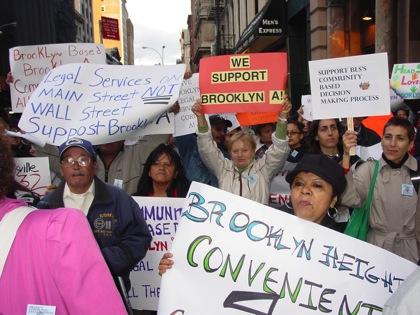Williamsburg’s community leaders are organizing to stave off a possible consolidation threat facing the Brooklyn branches of Legal Services New York City.
At a meeting held in Long Island University last week, 33 community leaders, including representatives from two congressional offices and several nonprofit executives, shared their concerns about a proposal to restructure Legal Services’ Brooklyn-based offices into a single entity.
“Maintaining Brooklyn A is absolutely critical to the many low-income people of Williamsburg and Greenpoint, an increasingly forgotten and neglected population,” said St. Nicks Alliance Executive Director Michael Rochford, formerly known as St. Nicholas Neighborhood NPC. “We’re very worried about the effect consolidation might have on the population St. Nicks serves.”
Brooklyn Corporation A attorney Marty Needelman said that the goal of the meeting was to strategize recommendations to Legal Services board members who will be present at upcoming board meetings on March 9, where they will hear official restructuring plans, and then on April 13 ultimately confirm or reject them.
Brooklyn Corporation A attorney Marty Needelman said that it is very difficult to predict what will happen in the future.
“Privately they have told us the plan will be a single program in Brooklyn,” said Needelman. “It would not be a corporation, but a branch of the city program and it would be run by the people of South Brooklyn.”
Their response comes four months after attorneys and staff members for Brooklyn Corporation A and South Brooklyn Legal Services (SBLS) held a rally at their parent corporation’s headquarters in downtown Manhattan to protest the move. Joined by several Brooklyn-based community organizations, the demonstrators abruptly took over a Legal Services board meeting, where several community leaders delivered public testimony.
Legal Services NYC Executive Director Andrew Scherer has not publicly revealed what restructuring plans, if any, the parent organization is considering.
“In Legal Services NYC’s effort to optimize our delivery of services in Brooklyn, we have been evaluating the work we are currently doing in the borough by talking with community groups, leaders, staff and others,” said Scherer. “We expect to use the information we are collecting to come up with a plan soon that will strengthen our ability to serve the clients and communities throughout Brooklyn.”
But Rep. Ed Towns (D-Williamsburg) calls any consolidation move a “huge mistake” that would result in the reduction of legal services in Brooklyn.
“Will people from Canarsie or Flatlands make the long trek to Downtown Brooklyn to seek legal services? I sincerely doubt so, as do the many community leaders and constituents who have sounded the alarm on this matter,” said Towns. “Brooklyn’s existing structure of legal services satisfies the true intent of legal services as envisioned by the Civil Rights Movement. We should be discussing ways of expanding this model across Brooklyn, rather than protecting its survival.”
Evelyn Cruz, a congressional constituent liaison for Rep. Nydia Velazquez (D-Williamsburg), has criticized this process and reflected concerns from Velazquez, who is opposed to any consolidation move that could change the mission of neighborhood legal clinics that Congress once authorized.
“Their purpose is to ensure that families, low-income residents, the disadvantaged, have an opportunity to go to satellite legal services, to be part of the process with the board, to be board members, stakeholders, local organization of legal services,” said Cruz. “They know the needs best.”
If a consolidation move does go forward, Needelman predicts that things could get ugly, resulting in a complete disassociation or a negotiation of an amicable divorce.
“The saddest thing is we’re preoccupied with this distraction when the real issue is lack of resources and money,” said Needelman. “LSNY is the largest federally funded civil legal-services program in the country, and has not taken a leadership role raising money nationally or dealing with these issues nationally. They have alienated local Congress members who would be critical for that support.”
























